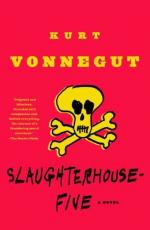|
This section contains 369 words (approx. 1 page at 400 words per page) |

|
Slaughterhouse-Five describes man's inhumanity to man, and the mass destruction of Dresden by Allied forces serves as Vonnegut's primary example.
Although a humanist at heart, Vonnegut repeatedly demonstrates the human aptitude for cruelty, and he shows how technology magnifies this cruelty beyond human control.
At a deeper level the novel explores the moral vacuum in which contemporary human life exists. Vonnegut's outrage over Dresden was as much a result of the lack of attention given to this event as it was to the bloodshed, but there are no villains in Vonnegut's novels, and he fully recognizes the ambiguous connection between agent and victim. Thus, in one of the novel's many Biblical allusions he sympathizes with Lot's wife who looks back at the destruction she is escaping before being turned to stone.
Slaughterhouse-Five, which is about Vonnegut's effort to tell his story as much as it is...
|
This section contains 369 words (approx. 1 page at 400 words per page) |

|




